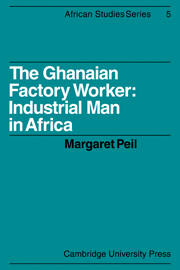Summary
Every year, hundreds of thousands of West Africans leave their homes to live and work, at least temporarily, somewhere else. Migration always requires some adjustment to the new place, but the adaptation required of African migrants to the cities is often considerable. It is least drastic for those who grow up in a town. Less adaptation is required of southern Ghanaians of rural origin than of rural northerners. Southern villages have been under urban influence for generations and many of their residents are able to visit the towns before deciding to move. Northerners, on the other hand, tend to live in dispersed farmsteads rather than in villages and many have never visited even a small town prior to their migration. This chapter is concerned with the geographical aspects of migration and with factors influencing the choice of destination. The problems migrants face in adjusting to life in town will be dealt with in the following chapter.
Studies of African towns often include information about the origins of residents. Censuses can also provide information on the international and interregional flow of migrants, but published data from the 1960 Census in Ghana is limited to birthplace material and even this is not specific for the origins of migrants. Individuals are classed as ‘born in the locality of enumeration’, ‘born in another locality but within the region’, ‘born outside the region but in Ghana’, ‘born elsewhere in Africa’ or ‘born outside Africa’.
- Type
- Chapter
- Information
- The Ghanaian Factory WorkerIndustrial Man in Africa, pp. 126 - 149Publisher: Cambridge University PressPrint publication year: 1972



